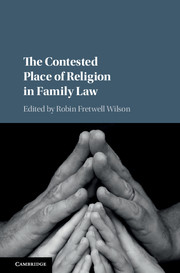Book contents
- The Contested Place of Religion in Family Law
- The Contested Place of Religion in Family Law
- Copyright page
- Dedication
- Contents
- Notes on Contributors
- Foreword
- Acknowledgements
- Introduction
- Part I The Foundations and Boundaries of Religious Liberty
- Part II Religious Claims at Birth
- Part III Religious Claims in Childrearing
- Part IV Rethinking Marriage After Obergefell
- Part V Religious Claims at the End of Life
- Part VI Shaping the Legal Culture of the Family
- 21 Taking Colliding Trains Off a Collision Path
- 22 Family Law and Civil Rights Movements
- 23 Latter-Day Constitutionalism
- Part VII International Perspectives
- Book part
- Statute Index
- Case Index
- Subject Index
21 - Taking Colliding Trains Off a Collision Path
Lessons from the Utah Compromise for Civil Society
from Part VI - Shaping the Legal Culture of the Family
Published online by Cambridge University Press: 11 May 2018
- The Contested Place of Religion in Family Law
- The Contested Place of Religion in Family Law
- Copyright page
- Dedication
- Contents
- Notes on Contributors
- Foreword
- Acknowledgements
- Introduction
- Part I The Foundations and Boundaries of Religious Liberty
- Part II Religious Claims at Birth
- Part III Religious Claims in Childrearing
- Part IV Rethinking Marriage After Obergefell
- Part V Religious Claims at the End of Life
- Part VI Shaping the Legal Culture of the Family
- 21 Taking Colliding Trains Off a Collision Path
- 22 Family Law and Civil Rights Movements
- 23 Latter-Day Constitutionalism
- Part VII International Perspectives
- Book part
- Statute Index
- Case Index
- Subject Index
Summary
- Type
- Chapter
- Information
- The Contested Place of Religion in Family Law , pp. 539 - 562Publisher: Cambridge University PressPrint publication year: 2018



